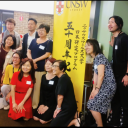第95回「耳かき」って何?
What is Mimikaki?
日本人には常識でも、文化の違うオージーにはイマイチ伝えづらい…。
そんな時にぴったりの表現や話の流れをご紹介。
(文:池田俊一 オーストラリア国立大学アジア・太平洋カレッジ日本センター 協力:池田澪奈)
エピソード
友人が『自分では怖くてできないから、耳かきは奥さんにしてもらう』と言っていたけれど、これってどういう意味?
Aussiehat is t his word “耳かき”(mimikaki)? Does it have something to do with the ears?
YouYes, it certainly does. 耳かき(literally ‘ear rake’) is a tool that is used in households all over Japan to pick out ear wax from within the ear canals. It’s slightly different from Western cultures where a cotton swab and / or liquid is used to clean out the ears – instead, there is a specific ear-cleaning tool called 耳かき, and they are usually made out of bamboo or metal.
AussieBamboo or metal?! That sounds so hard on the insides of the ears… That’s a very sensitive area you know.
YouWell, you don’t go poking it in blindly! They’re not sharp, either, but are more curve-tipped so that you can scrape the wax out from within the ear canals.
AussieI still don’t feel comfortable putting such a thin, solid object into my ears – you really can’t see what you’re doing in there!
YouI guess there’s a strong cultural aspect of 耳かき in Japan as, for generations, mothers have sat their children’s heads on their laps, and regularly cleaned out their ears. These days, there are even parlours where customers can spend half an hour to an hour to have their ears cleaned by a woman, to relive these kinds of memories.
AussieOh, wow. Did you get your ears cleaned by your mother, too?
YouYes, I did. Although, it hurt sometimes because she would go in too deep…
AussieARGH! See, I told you that it sounded too rough for the insides of your ears…!
YouYet, it was such a close bonding moment with my mother, so I did enjoy getting my ears cleaned out.
説明する時のポイント
「耳かき」という言葉は、耳に溜まった耳垢(あか)を取り出す時に使う、竹製や金属製の小さな道具を指すと同時に、耳垢を取り出す行為そのものを指す、と教えてあげよう。一般的に、黒人や白人の耳垢は粘性なので、耳垢は綿棒や専用の液体を使って除去するが、アジア人の耳垢は乾いているので、先端がへら状になった竹製や金属製の棒で、耳垢をかき出すことができると付け加えておこう。また、竹製のへら状になった先端の反対側には、梵天(ばんてん)と呼ばれる、綿棒の役割をする水鳥の羽毛が付いていることが多い、と補足しておこう。更に、料理の際、調味料の量を説明する時、「ほんの少し」という意味で「耳かき1杯程度」という言い方をするということにも触れてはいかが? 「耳かき1杯程度」の砂糖で十分、という風に。
【単語・成句】
have something to do with ~ ~と何か関係のある
in household 家庭内で
ear wax 耳垢
ear canal 外耳道
cotton swab 綿棒
sensitive area 簡単に傷付きやすい部分
poking / poke 突っつく
in blindly 闇雲に
curve-tipped へら状の
scrape かき出す/すくい出す
still don’t feel comfortable まだ受け入れ難い
relive 再現する/追体験する
close bonding moment 絆を強く感じるひと時
get my ears cleaned out 耳掃除をしてもらう
【会話文で使える表現】
“See, I told you (that ~ / so).” という言い方は、相手の言ったことに対して「ほら、ごらん/そう言っただろう/言わんこっちゃない」とやんわり自分が言ったことが正しかったことを自慢する時に使われる。
【例1】“I failed to submit my homework on time.” “See, I told you that you should start early.”
「宿題を締切日までに出せなかったんだ」「ほら、だから早く始めろと言っただろう」
【例2】“I seem to have caught a cold, because I didn’t wear warmer clothes yesterday.” “See, I told you so.”
「昨日、もっと暖かい服を着れば良かった。風邪を引いたようなんだ」「だから、言ったでしょ」
【例3】“Oops, this dish is too salty. Did I put too much salt in?” “See, I told you that a pinch of salt was enough for this dish.”
「おっと、この料理、しょっぱい。塩を入れ過ぎたかなあ」「ほら、この料理には耳かき程度の塩で十分と言ったのに」











